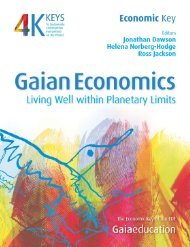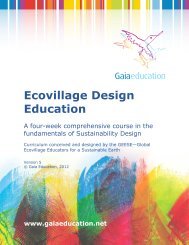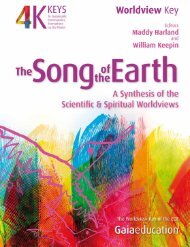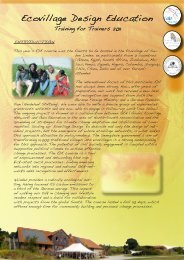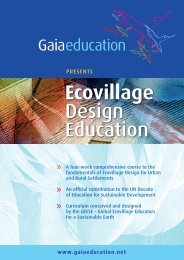Designing Ecological Habitats - Gaia Education
Designing Ecological Habitats - Gaia Education
Designing Ecological Habitats - Gaia Education
Create successful ePaper yourself
Turn your PDF publications into a flip-book with our unique Google optimized e-Paper software.
emergy anD ecovillage 181<br />
transformity. All energetic processes on Earth ultimately originate with the<br />
initial pure solar input; this is fundamental. The solar input is utilized by biogeophysical<br />
processes at successive steps along the economic pathways until<br />
it is eventually consumed; but at each step the initial solar input (available<br />
energy) does work of some kind for the system as a whole. Transformity,<br />
then, is a measure of the stage of solar degradation, and subsequently,<br />
almost paradoxically, energetic investment. “Goods and services that have<br />
required the most work to make and have the least energy have the highest<br />
transformities” (Odum, p.10). To the left of the systems diagram is high<br />
potential energy but low transformity and to the right of the diagram, after<br />
successive stages of use, is low consumed energy but high transformity.<br />
EMERGY is a calculation of the total energy used in the process, and does<br />
not degrade or diminish, but accumulates.<br />
Do you see how this idea could be useful when determining the value<br />
of energy inputs to an ecovillage? Think about this book you are reading.<br />
It embodies extremely high transformity but relatively low energy. How<br />
many decades of accumulated study and experience did it take for all the<br />
contributing authors to finally get their words down on paper? How many<br />
meals did the authors consume during all those years? How many individual<br />
plants were cultivated and harvested to make those meals? What, then, was<br />
the total solar energy input that went into producing this book – even before<br />
it went into the energy consumption phase of designing, printing, and<br />
distributing? While a market economy may assign this book the equivalent<br />
value of, say, ten meals and fifty harvested plants, the actual value – what<br />
Odum terms real wealth – is much, much higher. As another example, what<br />
is the real wealth – in terms of total solar energy input – of the genetic<br />
inheritance of plants that took millennia to adapt to a specific niche? Do you<br />
see what I’m getting at? A sustainable economy, one that is not subsidized by<br />
fossil fuels, will need to start paying attention to these energy transformities.<br />
A sustainable ecovillage will prioritize the preservation and enhancement of<br />
those energy inputs that benefit the ecovillage over the longest term.<br />
Another way of looking at this is in the language of the energetics of<br />
the fundamentals of ecology: “Terrestrial energy in any form ultimately<br />
originates from the Sun. Plants, as primary producers, collect this energy and<br />
utilize it in their metabolism, photosynthesis, creating sugars and expelling<br />
degraded energy. Humans and herbivores then absorb plants for their own<br />
metabolism, and in turn expel degraded energy into the environment as<br />
waste material that can be utilized by bacteria and other decomposers. The<br />
bacteria and decomposers then convert this waste material back into a form<br />
that can be utilized by plants. The original pure solar input is eventually lost,<br />
however, so the plants need a continual supply of incoming solar energy<br />
to keep the whole process alive. This is a simplified version of the primary<br />
energy cycle of Life on Earth – it all begins with the Sun. The continual,<br />
inevitable degradation of incoming solar energy to less usable forms is<br />
termed ‘entropy’ (heat loss to the environment). A viable economy – which<br />
ultimately means the process by which Life sustains Itself – will be modeled



